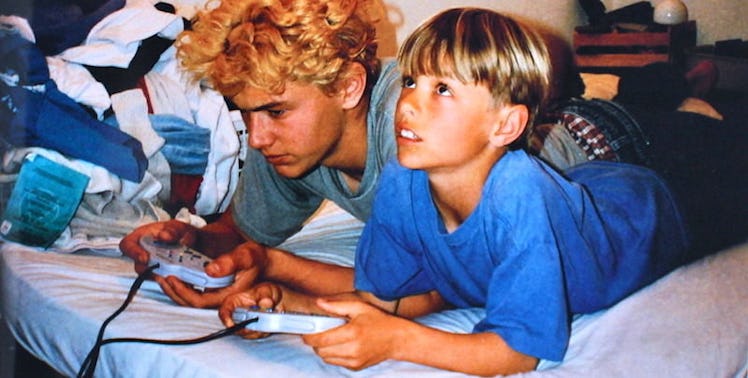
Dear Mom: Video Games Aren't Bad For You, They Make You A Better Person
As a kid in the early 90s, I had video games.
If I grew up in the 70s, I might have had a walk-in closet full of classic rock vinyl (like my father) – or, in the 30s, a massive set of baseball cards (like his father).
But I grew up in the 90s, a decade highlighted by the rapid progression of electronic and handheld entertainment. So I had video games. And let me tell you... I wasn’t alone.
By the time the late 90s hit, video games rose to the forefront of Millennial curiosity. There was Atari. Dreamcast. Playstation. N64.
My entire group of friends was a gaggle of pre-pubescent fiends, constantly searching for our next fix of Donkey Kong (or even a little Zelda) -- anything to whet our ADHD-fueled whistle.
I mean, put it this way: I ran for president of my second-grade class and WON the f*cking election – purely off the strength of my presidential oath to uphold a “Bring-Your-Gameboy-2-School Day,” which I never actually got around to enforcing (the first of many broken promises from that candidacy).
Video games were very much a way of life for a young 90s kid. And we didn’t abandon them once the 2000s rolled in. No -- as time progressed, so did our video game palates.
We soon stopped longing for the latest installment of Mario Party – or for my personal favorite, Mario Tennis.
No, we found ourselves gravitating toward games with guns... and briefly-shown, graphically-designed breasts from the scenes that were cut.
As teenage balls of hormones, we wanted violence; we wanted action. And video games brought that sh*t directly to our basements, for, like, $50 a game.
If we wanted to reenact a scene from World War II – blaka! – we’d beg our parents to buy us Call of Duty. If we wanted to play in the league – swish! – we got NBA 2kWhateverYearItWas.
I remember trying to convince my mother to buy me a copy of the new GTA when it was released on XBOX 360 in 2004.
She just couldn’t understand why I “had to have” a video game predicated on the mastery of some gangsta lifestyle. (Especially coming from a 12-year-old kid who attended two different bar mitzvahs each weekend.)
My mother believed we were products of our environment, and that violent video games would lead to violent life behavior. Though I couldn't blame her, I stuck to my ground when it came to video games.
I was never worried that I would become a product of my virtual environment. In my opinion, video games weren’t real.
I knew I stepped into fantasy every time I picked up a video game controller -- one that never replaced what was in front of my face off-screen.
Just as I never expected to get drafted by the Jets after playing a few games of Madden, I never anticipated performing random acts of violence after hours of Grand Theft Auto.
The violence and action in video games didn't turn a law-abiding citizen into a criminal. They were compensation for the lack of action that I experienced in my own real life
That’s what made them so fun. And, as reported by Susan Krauss Whitbourne, Ph.D., for Psychology Today, video games may be more than just fun.
According to Whitbourne, “there's an upside to pro-social video games,” one that revolves around higher empathy.
One study, conducted by Tobias Greitemeyer and researchers at the University of Innsbruck, tested to see if “video games could turn schadenfreude into empathy.” (Schadenfreude, essentially, is joy brought about by someone else’s pain.)
Using test subjects in their 20s, experimenters offered two different styles of video games (one that required empathy and one considered to be neutral) to participants.
Using a variety of different personality assessments, experimenters measured empathy levels following ten minutes of play.
In fact, one of the assessments required participants to read a brief report about “the misfortunes of billionaire heiress and actress Paris Hilton in which she was sent to jail after one of her many parole violations” and report any feelings of schadenfreude.
After playing Lemmings -- the game that required empathy -- for just 10 minutes, test subjects reported significantly less schadenfreude than they had prior to playing.
And when these subjects had been asked to report their feelings on other people’s misfortunes, results proved that their increased empathy wasn't confined to matters of Paris Hilton.
A link between video games and higher empathy had become scientifically verifiable.
The rationale behind this link, as explained by Greitemeyer, comes from the GAM, or General Aggression Model.
The GAM suggests that the type of content we see across popular media outlets can affect how we think. Having said that, Greitemeyer disclaims that this thinking isn't always negative.
Ultimately, if you surround yourself by positive things, you’ll probably be more inclined to lead your life in a positive way. The opposite also might hold truth – but isn’t necessarily a recipe for disaster.